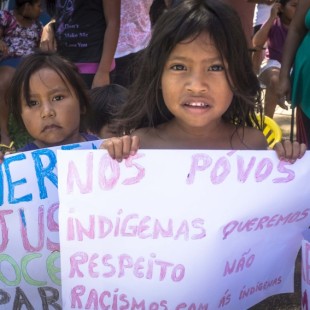01/03/2016 16:20
Agribusiness, mining, oil drilling and big-city commercial offensives like sports mega-events are all obstacles to political causes such as food sovereignty, with healthy food for all; environmental justice, defending territories and the cultures that thrive in them; and the right to the city, confronting attacks and the militarization of life. The present mode of development is especially harmful to women, in particular black, indigenous and poor women impoverished by the prevailing economic system. On International Women’s Day, March 8, we stress that male chauvinism and the violation of women’s rights play a structural role in the expansion of capitalism and the reproduction of inequalities.
FASE’s involvement in the fight for change together with women has nurtured reflections on the cross-cutting nature of gender issues. Fast-paced impositions of Brazilian developmentalism have had direct impacts on the lives and bodies of women living in cities, the countryside, riversides, backlands and forests. Markets, in close collusion with the state, even impose decisions on how they reproduce, showing how far Brazil really is from democracy. In response, women move to stand up as blacks, favela-dwellers, peasants, fisherwomen, sluts, lesbians or transsexuals, demarcating identities that recognize each other in the collectiveness of our being one and being all.
Even amidst all the analyses on the array of political actions and outlooks, one fundamental point remains: the self-organization of women is a necessary strategy, to be combined with others, against patriarchal forms of organizing the world. The effects of feminisms in movement have been felt by society, which has benefited from the emergence of debates and women’s victories, but also suffers from the reaction of forces that promote intolerance. The emancipation of women has always been and still is a disturbing event.
Part of Brazilian society even rejects the inclusion of reflections by a libertarian woman on the national college-entrance exam (Enem), and never got used to having a woman President. Dilma Rouseff’s government can certainly be criticized, but why must the body, wrinkles or sexual orientation of the woman governing our country become issues? It is symbolic and culturally significant for fields historically seen as masculine to be occupied by women. Nonetheless, this is clearly not enough. The country still displays a conservative face in various ways. Regression raises its head in decisions by both Congress and the Executive. For example, the federal Special Secretariat for Women’s Policies (SEPM), whose budget always fell short of this important agenda’s needs, was among the first agencies to be downgraded by the recent “fiscal adjustment.”
The SEPM’s publication “Women in Politics 2014” highlights that although they are the majority of the population, less than 10% of the members of the House of Representative are women. Twenty percent declared themselves to be black when registering their candidacies. There are no indigenous representatives at all in Congress. White[DH1] men occupy 72% of the seats in the House. The data shows that Brazil’s congress is predominantly made up of white businessmen.
Meanwhile, bills of law aimed at turning back progress are moving through Congress. One is Bill 6583/2013, the “Family Statute,” which denies any diversity in social-affectionate bonds, and Bill 5069/2013 (by House Speaker Eduardo Cunha), which makes it harder for victims of sexual violence to gain access to public healthcare. Another setback is Decree 8425, which restricts artisanal fishing and makes it very hard for fisherwomen to be covered as professionals. In this craft, like in family farming, women are often treated as “helpers,” along the lines of chauvinistic expressions that praise men for “helping” clean the house and bring up their own children. Of course differences must also be respected, along with equal rights and standing. One wonderful way to achieve this is the politicization of healthcare struggles, as in current struggles for humane deliveries and to extend both maternity and paternity leaves.
Women are going out to work, but men are not taking on housework. Adding the hours worked doing paid labor and housework, according to official federal data (IBGE), in ten years the difference between women’s and men’s working days grew by an hour. In 2004, women worked four more hours than men, per week. In 2014, the average woman’s working week was five hours longer than a man’s. While women work an average of 20 hours per week at home, a decade later, men still work the same 10 hours, half the time that women do. We must also reaffirm the political significance of defending women’s economic autonomy. Laws giving more rights to domestics do raise some hope, but they also remind us that their jobs are among the worst paid.
Another key focus is fighting physical and psychological forms of aggression. The “2015 Violence Map” shows that 50% of women who die from violence in Brazil are murdered by someone close to them, mostly spouses and former spouses. From 2003 to 2013, discounting the growth of the female population, the national homicide rate against women grew by nearly 9%. Today, at least 13 women are murdered every day in the country. Small cities have the highest rates of homicides against women. Brazil’s media, extremely concentrated in a few corporate hands, continues to portray feminicides (the murder of women because they are women) simply as crimes of passion.
Despite so many difficulties, in our assessment, women at FASE as comrades of organizations, social movements, unions, associations, fora, networks and others have been active in mobilizing for profound changes. They call into question consumerism, life without quality and the exploitation of common goods such as water, air and land. They help build community bakeries with no bosses in the Amazon; fight to demarcate quilombola territories in Espírito Santo; confront the guns of “public safety” forces that promote the genocide of young people in Rio de Janeiro; build more democratic recycling communities in Pernambuco; and sow agroecology in Mato Grosso and Bahia. In short, women are building alternatives and resistance among various peoples and different arenas, since “a woman’s place is wherever she wants.” And one place women are demanding for themselves is no doubt in the thick of the struggles.















